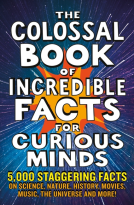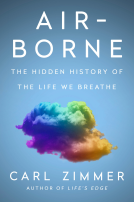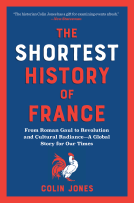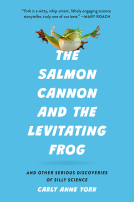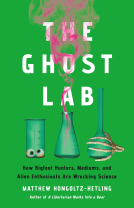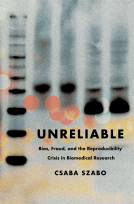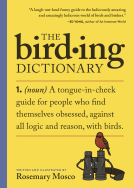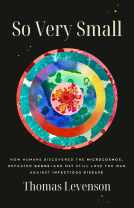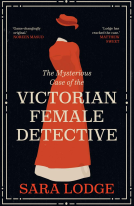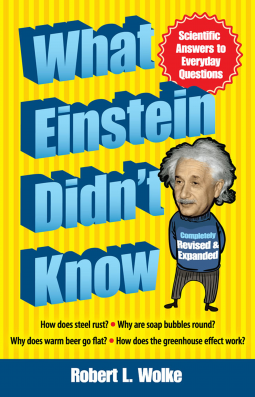
What Einstein Didn't Know
Scientific Answers to Everyday Questions
by Robert L. Wolke
This title was previously available on NetGalley and is now archived.
Send NetGalley books directly to your Kindle or Kindle app
1
To read on a Kindle or Kindle app, please add kindle@netgalley.com as an approved email address to receive files in your Amazon account. Click here for step-by-step instructions.
2
Also find your Kindle email address within your Amazon account, and enter it here.
Pub Date May 21 2014 | Archive Date Jul 30 2014
Description
Discover how cricket chirps can tell us the temperature, why you can't unburn a match, why ice floats, and a host of mysteries of modern living — including some riddles that maybe even Einstein couldn't solve. From the simple (How does soap know what's dirt? How do magnets work? Why do batteries die?) to the more complex (Why does evaporation have a cooling effect? Where does uranium get its energy?), this book makes science more understandable and fun.
Author Robert Wolke provides definitive and easy-to-comprehend explanations for things that we take for granted, like the illumination behind neon signs and the mysteries of beverage carbonation. Wolke also dares readers to explore and conduct their own experiments with food, kitchen utensils, and common household products. This fifteenth anniversary edition of his bestselling popular science classic has been completely revised and expanded.
Available Editions
| EDITION | Other Format |
| ISBN | 9780486492896 |
| PRICE | $14.95 (USD) |
Average rating from 20 members
Featured Reviews
 Ricki W, Reviewer
Ricki W, Reviewer
What Einstein Didn't Know is a great question and answer book that addresses a number of life's little mysteries. Why does a covered pot boil sooner? When a candle burns, where does the wax go? Why can we see through air? The explanations do tend to get a wee bit wordy at times, but overall, I would recommend this book to anyone with an interest in the science of everyday life.
Science with a sense of humor This is a fun book to read. Written in a highly accessible and conversational tone, this book will appeal to those with or without a science background. Author Robert L Wolke shows both his love of science and his sense of humor in this book. He also shows that science is all around us. I recommend it for everyone.
 Lora M, Reviewer
Lora M, Reviewer
What Einstein Didn't Know is not just a book filled with trivial facts about science and nature, but explanations for why things happen as they do. The fun starts right away in the table of contents where you can see the interesting selection of pieces of information that comprise this most fascinating book.
Examples include; chemicals that make water hot or cold and why, how dry ice works, what the term 'proof' means on an alcohol bottle and where the term came from, what is used to fortify cereals with iron in a non-toxic form, what makes the foam on your Starbucks coffee, the difference between incandescent and fluorescent lights as well as LEDs, how to read bulb packages and a nifty conversion for those who remember incandescent bulbs in watts (for example, an old 40 watt bulb is 500 lumens) and how to tell if a crab is male or female. And that's just the first chapter!
Further chapters cover information about how things work in the kitchen or around the house, the infernal combustion engine, the great outdoors, water, and the basic laws of nature. Do you know how infrared radiation works to allow thermo-imaging devices to make it possible for us to see in the dark? I do now, because I've read this book. Everything from ocean breezes to the reason for optimum hours to get sunburn is explained in easy and often amusing terms. There is even a section in the back to explain buzzwords, those scientific terms that build your vocabulary and comprise part of the language of science.
This is a book to read in segments, at least for me. Too much information at once can get lost in the assimilation, but the pieces of information are fascinating and would make great fodder for pub quizzes. This is one I am likely to go back to for references many times and to read through again to remind myself of all the fascinating facts that I might have forgotten after the first reading.
Highly recommended!
 Kimberly S, Librarian
Kimberly S, Librarian
Dr. Wolke is a professor with a heart for teaching. He gives correct, concise, understandable explanations for everyday phenomena. If you want to know why dry ice makes fog or what makes superglue so effective, Dr. Wolke is your man.
Recommended readers include science teachers, parents of curious children, or anyone who wants to understand the science behind things they see in daily life.
 Bassocantor ., Reviewer
Bassocantor ., Reviewer
✔ Can You Pre-Stress Concrete by Playing Rock Music?
This is a fun little book with lots of fascinating facts and ideas that I didn't know. Did you ever wonder how antifreeze in your car not only makes the freezing point lower, but makes the boiling point higher? Well, in WHAT EINSTEIN DIDN'T KNOW, you are going to find out!
► THINGS I LIKED BEST ◄
♦ Sections called, "You didn't ask, but ..." This gives information on a related subject. For instance, talking about how glass is made to not shatter (i.e., for cars) by using "prestressing," the author notes that a similar concept is used to pre-stress concrete. A similar sidebar explains why salt on the road causes your car to rust faster. (By making a solution that is a better conductor of electrons.)
♦ There are "Try It" sections that suggest ways at home to explore the concepts in each chapter. For example, after explaining airflow dynamics, the author suggests watching the wings of an airplane on a humid day. Since the air going over the wing is expanding, it will be much colder, and can condense water vapor in the air. Neat!
► RATING OF KEY FEATURES ◄
♦ Readability: Well-written, easy to understand.
♦ Quality of Figures/Photos: Funny and well-done illustrations. My favorite was the guy on the lounge rubbing alcohol on himself to cool down.
♦ Quality of Index/Table of Contents: Extensive, with special annotation of what is in each chapter. Nice section of "Buzzwords" at the end of the book. Also good index. Very helpful!
♦ Quality of Editing: Good design, easy to follow.
√ All in all, a very interesting book. Well-designed, well-written, informative, fun. What else could a reader want? Recommend!
♫ A Review by Chris Lawson
Note: I do not know the author of this book, and no one requested I write this review.
AND NO, YOU CAN'T PRESTRESS CONCRETE WITH ROCK MUSIC. THAT AUTHOR TRICKED ME ON THAT ONE!
 Dana B, Reviewer
Dana B, Reviewer
This is a well-written book with simple easy to understand explanations of the science behind every day things. It is a cornucopia of scientific trivia written in a way that most people can understand including facts about things like why and how iron is added to food, the science behind espresso, what blurping is and what causes it, why flames are different colors and more. There are many explanation about how chemistry works in our everyday lives in things like soda, rubber, styrofoam, auto glass, prestressed concrete, rust, and antifreeze. Thre is information about natural events as well like ocean breezes and waves, and the greenhouse effect and more. I received this book free to review from Netgalley and I highly recommend it.
Readers who liked this book also liked:
Nigel Henbest; Simon Brew; Sarah Tomley; Ken Okona-Mensah; Tom Parfitt; Trevor Davies; Chas Newkey-Burden
Entertainment & Pop Culture, Humor & Satire, Nonfiction (Adult)
